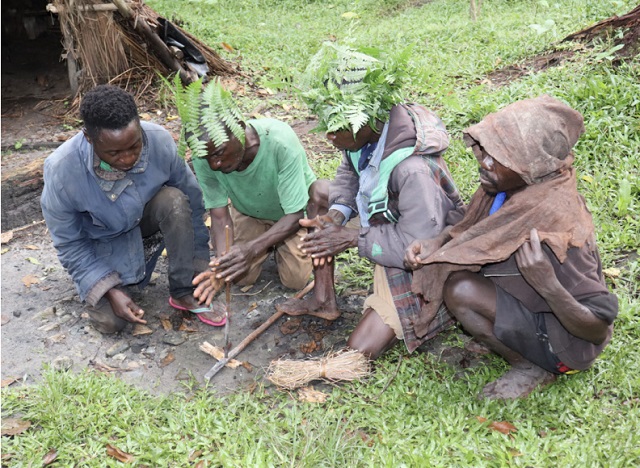
Kasese, Uganda | THE INDEPENDENT | Leaders of a tiny ethnic minority and civic society actors in Rwenzori Region are asking government to create an independent commission in charge of the minority tribes to take care of their prevailing challenges.
Some suggest to government to consider putting up a complete ministry to deal with their concerns.
They say that the present equal opportunities commission -EOC has a lot of groups to handle under its docket thus failing to promote the interests and concerns of the minority communities across the country.
The small tribes argue that they have lost their way of life, traditional livelihood, occupations and land use leading to the loss of language, culture and norms as well as subjugation by their more dominant neighbours.
Elisha Mugisha Ateenyi, the cultural leader of Banyabindi minority tribe in Kasese District argues that unless a separate ministry or a commission is set up to address the challenges and historical injustices suffered by ethnic minority groups, the communities will continue to lose their unique identity resulting into their extinction.
He told URN in an interview that a number of resolutions over the continued displacement and relocation of ethnic minorities from their traditional lands remain unresolved because the equal opportunities commission is limited in its mandate.
Ndahura II Kashagama aka Kashagama Daniel, the cultural leader of Basongora Community says they needed the commission even “yesterday” to expedite the process of recognizing cultural institutions for ethnic minority groups.
He reasons that kingdoms can play a big role in supporting social-transformation of minority groups.
Francis Opio a program officer at Rwenzori Forum for Peace and Justice-RFPJ told URN reporter that a commission is needed to have a framework under which rights of minorities can be protected.
He says that due to their small numbers, history, marginalisation, prejudice and stereotypes ethnic minorities hardly feature in any national political or cultural discourses dispute the existence of forums trying to protect them.
Lucas Bwambale Buhaka, the chairperson peace actors Kasese District agrees that a separate commission would give more attention to the issues concerning the minority groups.
However, Buhaka has some reservations that most commissions and ministries have failed to fully perform due to the absence of political will.
Agnes Kabajuni, the Africa Director for Minority Rights Group International informed URN that minority groups are the target of conflicts because they are less in terms of population and live alongside dominating groups and get easily excluded from the development processes.
She reasons that by giving attention to this group it means they will be helped to develop and a commission would aid elimination of conflicts.
Reknown Psychologist and peace actor Rev. Fr. Dr. Pascal Kabura told our reporter that minority rights are still suppressed due to lack of a working legal frame work.
Kabura thinks that once such a commission is put in place it will also reduce on the scramble to meet the president that has been the order of the day.
But Barbra Babweteera working with the EOC says Government is implementing a policy frameworks recognizing minority groups in national development programmes.
A new report produced by Kabarole Research and Resource Centre-KRC on conflict mapping in Rwenzori Region notes that most conflicts have been driven by desire for self-determination along ethnic lines, scarcity of resources and politics among others.
The report recommends to government to improve the land governance framework and ensure land ownership by vulnerable members of the society.
Uganda recognises minority groups such as the Bamba, Babwisi, Bagwe, Bagungu, Banyabindi, Bakenyi, Kebu, Nubi and the Ngikutio.
Some groups are yet to be recognised in the Third Schedule of the constitution. These include the Basese, Bagangaizi, and the Benet.
*****
URN
 The Independent Uganda: You get the Truth we Pay the Price
The Independent Uganda: You get the Truth we Pay the Price


